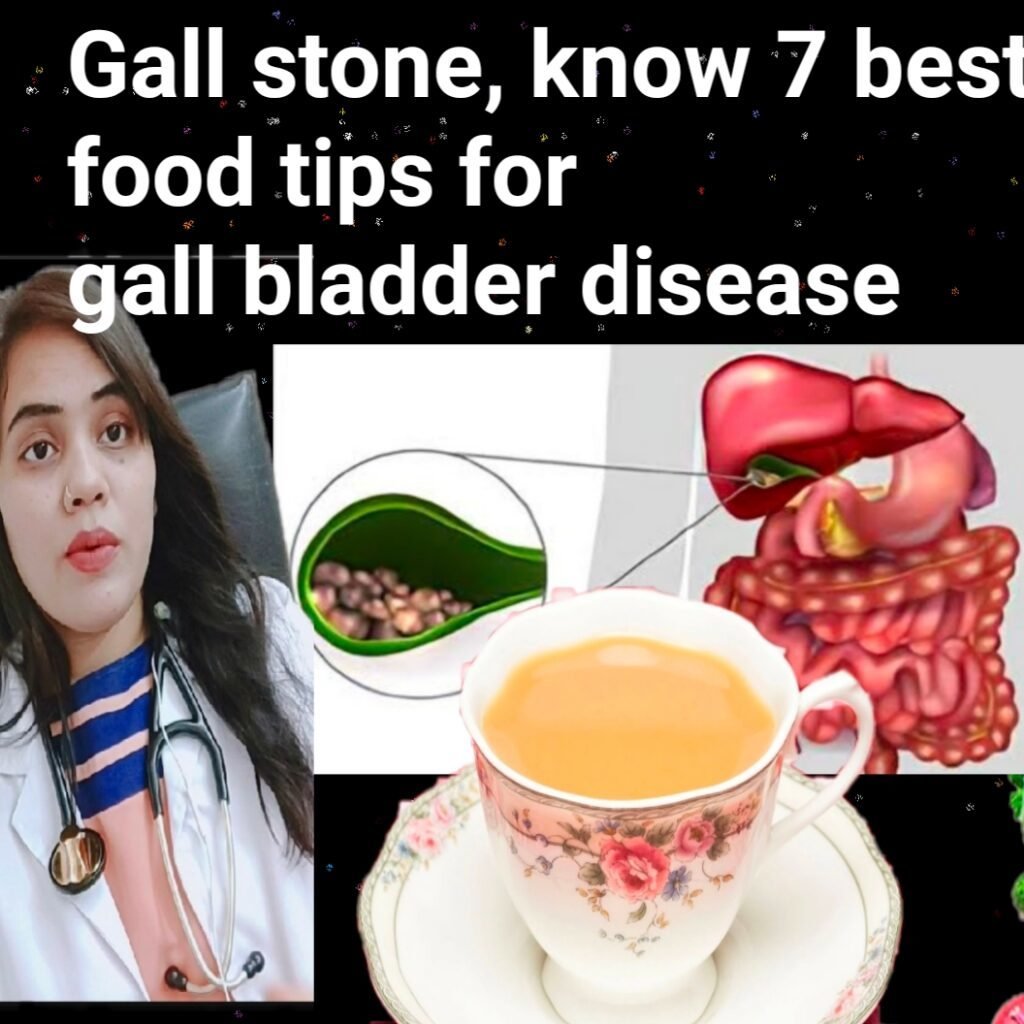Gall stone, know 7 best food tips for gall bladder disease
The gall bladder is an organ which is attached to the right side of the undersurface of the liver
Gall stone is more common in woman than the male,
Especially obesity and insulin resistivity increases the risk of gall stone formation
The main function of the gall bladder is to concentrate and stored the bile which is formed in the liver and it is stored in it until our body can not need to digest fat.
The bile duct is present in the small intestine which helps to proper digestion.
These bile constituting water, fat, bile salt, proteins, cholesterol, and bilirubin, if in some condition bile contains too much cholesterol, bilirubin, or bile salt it hardens the stone.
There are two types of gallstones these are:-
Cholesterol stone and,
Pigment stones.
Both diseases are closely associated with liver disorders.
The common diseases that occur in the biliary tract are as follows:-
cholelithiasis:-
It is formed in the absence of any infection in the gall bladder without showing any symptoms. It can be acute or chronic.
Choledocholithiasis:- The condition when stone slip down or produced any obstruction pain and cramp is known as choledocholithiasis
cholecystitis:- it is a condition of inflammation of the gall bladder due to caused by a backflow of bile because of gallstone obstruction. In these situations, the person may suffer upper quadrat found in abdominal pain along with nausea, vomiting, or flatulence. before knowing the
Complication or risk factor which is responsible for the formation of gall stone:-
Pregnancy,
Mostly female is more risk than male,
Elderly people,
Obese people
Diabetes mellites,
Family history.
High consumption of dietary fat,
Mild chronic infection,
Severe weight loss,
Inflammatory Bowel Syndrome
Other risk factors are biliary tract infection,
Liver cirrhosis,
Feeding of parenteral nutrition in long term,
Thalassemia,
And sickle cell anemia.
Dietary tips for managing gall stones:-
1.Fat restriction help to reduces the discomfort.
2.During the acute phase of gallstone taking adequate rest with fat restriction helps to lower contractions.
3.The complete fat restriction should help in minimizing the severity of gall stone,
After that, you can gradually include fat but in very low in quantity.
Starting from 2 grams up to 40 grams for improving food palatability.
If all the symptoms are reduced then, you can give them,
4.Clear vegetable or fruit juices,
5.Refined cereals food preparation,
6.Toned milk can be given in moderation.
7.Diet should be moderate in fat such as 30- 40 grams is sufficient, so select low-fat food products.
Later, you reduce the intake of refined cereals and their products.
A moderate amount of fat restriction should be beneficial.
8.Good fat such monounsaturated fatty acids and polyunsaturated fatty acids along with medium-chain triglycerides can be given in moderation.
Monounsaturated fatty acids increase the level of good cholesterol such as HDL and reduce the level of bad cholesterol LDL.
A low-fat dairy product such as skimmed milk,
Paneer,
Fish,
Egg,
Taking this food product in moderation may help to get good quality protein,
But taking plant-based food products is always a better choice because animal protein may increase the risk of stone formation.
1.Taking enough amount of fiber helps to reduce the sterols in the bile acid from the gut.
Soluble type of fiber, which is generally found in:-
Whole fruits,
Whole vegetables,
Pulses with husk,
Sprouts,
Nuts and seeds especially flax seeds,
Because they are not only the source of the good soluble type of fiber but also contain omega 3 fatty acids.
2.Taking methi seeds help to improve good microflora for inhibiting the process of forming extra bad cholesterol as well as it gives little time to produces a secondary type of bile acid which is good for less absorption of deoxycholic acid.
3..Supplementation of fat-soluble vitamins and water-soluble vitamins helps the recovery of chronic gall bladder diseases.
4.Intake of vitamin C-rich foods is beneficial because it decreases the risk of cholelithiasis.
5. Drinking Coffee and tea shows the protective effect against the formation of gall stones because coffee helps to stimulate the process of realizing cholecystokinin which increases the mobility of gall stones or maybe enhances the mobility of the large bowel.
Caffeine present in tea or coffee helps to slow down the process of cholesterol crystallization, and absorption of gall bladder fluid, it is also responsible for increasing hepatic bile flow.
Food should avoid:-
All the types of fried foods,
Dry fruits or dried nuts,
All the sweet dishes, mithai, and chocolate,
Limit the intake of spices,
Papad,.pickele,
All the types of chutneys,
Thick gravies and soups,
Khoya,.butter,
Ghee,
Whole milk,
Malai,
Refined cereals.
Food can eat:-
1.Tea / coeffe
2.Wheat / bajra / ragi / jawar roti
3.Well cooked rice,
4.Oats,
5.All the types of vegetables,
6.salad,
7.Egg,
8.All types of fruits,
Beverages,
A liberal amount of fluid,
All the types of pulses and dals,
Soup,
A moderate amount of fish, meat, and chicken
Most effective is the Mediterranean diet, with a liberal amount of fiber,
Taking pant based foods products and high fiber, low fat intake is playing a major role in treating gall stone as well as preventing it.
3.Daily physical exercise of about 30 min is necessary for preventing the risk of gall stone,
.Drinking a liberal amount of water also reduces the risk,
.Eating low salt and low sugary products help prevent the risk of gall stone forming.
Hence, eat healthy to prevent disease.
Until stay fit, stay healthy.
suggested readings:- https://nutritionistpujaukey.com/gluten-free-diet-avoid-this-7-gluten-rich-food/food-safety-and-covid-19/
want to get more information regarding health and nutrition to follow us on:-
youtube:- https://www.youtube.com/channel/UCQQ8So_uzwMTWx6HzFs648g
Facebook:- https://www.facebook.com/DietitianPujaUkey
